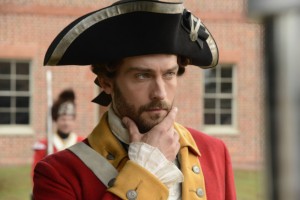 Sleepy Hollow’s characters sell the show. The series’ command of historical facts is erratic, and “far-fetched” doesn’t begin to describe its rapidly mushrooming mythology. With lesser personalities portrayed by lesser actors, this show would be nothing but nonsense. The fact that so many viewers have instead immediately embraced it speaks to the strength of Abbie Mills and Ichabod Crane as protagonists we care about, relate to, and want to learn more about. The moving scene at the climax of this episode, in which Abbie and Ichabod are painfully saying their good-byes, proves that they are the heart of the series.
Sleepy Hollow’s characters sell the show. The series’ command of historical facts is erratic, and “far-fetched” doesn’t begin to describe its rapidly mushrooming mythology. With lesser personalities portrayed by lesser actors, this show would be nothing but nonsense. The fact that so many viewers have instead immediately embraced it speaks to the strength of Abbie Mills and Ichabod Crane as protagonists we care about, relate to, and want to learn more about. The moving scene at the climax of this episode, in which Abbie and Ichabod are painfully saying their good-byes, proves that they are the heart of the series.
I worry, though, that the treatment of Ichabod in “The Sin Eater” risks distancing him from us. I don’t mean the revelation that, during his Revolutionary days as a loyal Redcoat, he oversaw the torture of Arthur Bernard (played by Tongayi Chirisa), a.k.a. “Cicero,” an emancipated black man who published a “treasonous” pamphlet advocating American independence. Discovering that characters grapple with flaws and past failures doesn’t necessarily make them less appealing. The exploration in earlier episodes of Abbie’s guilt for betraying Jenny, for instance, made her more complex and sympathetic. Now, however, Sleepy Hollow seems reluctant to let Ichabod wrestle with genuine guilt over a genuine failing. This rush to absolve him leads to some unsatisfying consequences.
“Cicero” and Sin
I studied a freeze frame of the title page of Bernard’s pamphlet as closely as I could. It appears to be a real publication entitled Plain Truth; Addressed To The Inhabitants of America, printed in Philadelphia in 1776. Its author did write pseudonymously, but under the name “Candidus.” Scholars, however, identify Candidus as James Chalmers, a Maryland loyalist who spent the pamphlet’s eighty-four pages rebutting Thomas Paine’s Common Sense. Chalmers builds to this conclusion:
Volumes were insufficient to describe the horror, misery and desolation, awaiting the people at large in the Syren form of American independence… [I]t would be most excellent policy in those who wish for TRUE LIBERTY to submit by an advantageous reconciliation to the authority of Great Britain… INDEPENDENCE AND SLAVERY ARE SYNONYMOUS TERMS.
(Even in olden times, folks knew how to SHOUT using ALL CAPS!)
In our world, Plain Truth wouldn’t have earned the wrath of the British Crown. In Sleepy Hollow, however, it ultimately leads Bernard to death, a death for which Ichabod has always held himself responsible. He believes if he’d acted sooner to help Bernard escape, the man would have lived.
I think he’s right! I thought it spoke well of him that, as Abbie’s conscience haunted her about her past sin, Ichabod’s refused to let him forget Bernard. But rather than give Ichabod an authentic chance for confession of sin and repentance, as Abbie was given in “For the Triumph of Evil,” Sleepy Hollow’s writers let him off the hook. Channeled through the Sin Eater, Bernard himself tells Ichabod, “My death saved your soul.” If he hadn’t died when he did, Bernard suggests, Ichabod might never have found his destiny. “Only you chose to see [your part in my death] as a sin,” Bernard assures him, “when all along it was your salvation.” Ichabod doesn’t need Bernard’s forgiveness (or, presumably, God’s); instead, he must forgive himself, because the Horseman feeds on Ichabod’s regret.
The conversation made me cringe. It reduces Bernard, an intriguing character in his own right, to someone defined almost entirely by his relationship to Ichabod. What’s more, because Bernard is black, it makes him a “magic Negro,” a stereotype I’ve discussed before. The “magic Negro” possesses secret knowledge and reveals it to white people in trouble, rescuing and redeeming them. “Magic Negro” stories apparently focus on a black character, but actually marginalize them. Bernard has been the victim of both slavery and imperialism—but we are told, in effect, it’s all good, because Ichabod Crane—our good white man who was an abolitionist and fellowshipped with Mohawks—needed Bernard in order to “find [his] way to [his] true home.” For a series that features so many actors of color in so many prominent roles, Bernard’s story seems a misstep, at best.
Perhaps Bernard was intended as a Christ-figure—certainly, his nobility and insistence on higher truth in the face of the abuse he receives from Ichabod and the other Redcoats calls to mind Christ’s similar composure and single-mindedness during his trial before Pilate—but the easy dismissal of Ichabod’s “sin” guts much theological significance from this story. Are there times when we must forgive ourselves? Absolutely, and the Gospel can give us the perspective and power we need in order to do so. But can all sin be addressed through self-forgiveness only?
Sleepy Hollow itself seems to know better. Earlier in this very episode, Abbie defined sin as “a transgression of divine law.” That’s an answer my own, Reformed tradition can certainly endorse; the Westminster Shorter Catechism, for example, defines sin as “any want of conformity unto, or transgression of, the law of God” (Q. 14). But are we really to believe Ichabod has never transgressed God’s law? Didn’t Ro’kenhrontyes (in “For the Triumph of Evil”) tell Ichabod, “Your sins aren’t mine to judge?” Is Ichabod, then, the only “judge” of his “sins?” Are we the only “judges” of ours?
We’d often like to think so. We would like to pretend that we’ve simply been mistaken, that we’ve been “beating ourselves up” over nothing, that we simply chose, wrongly, to see mistakes and imperfections as “sins.” But sin is more than a matter of self-condemnation. We deserve God’s condemnation. The good news is not that we have not sinned, but that God’s grace is greater than our sins—that when we sin, “we have an advocate with the Father, Jesus Christ the righteous; and he is the atoning sacrifice for our sins, and not for ours only but also for the sins of the whole world” (1 John 2.1-2).
Dining on Death
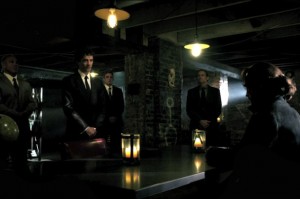 If you believe any of the myriad theories that are floating around the Internet, the Freemasons must be involved in any generations-spanning conspiracy surrounding esoteric knowledge and spiritual struggle. I think it’s in their contract.
If you believe any of the myriad theories that are floating around the Internet, the Freemasons must be involved in any generations-spanning conspiracy surrounding esoteric knowledge and spiritual struggle. I think it’s in their contract.
This week, the Masons finally reared their endlessly fascinating head in Sleepy Hollow. According to Abbie and Jenny, Masons are on the right side of the fight to avert the Apocalypse; they’re “the good guys,” along with the Knights Templar (another go-to group where centuries-spanning conspiracies are concerned; find some facts about them in Wendy Brydge’s recent post at her Seeker of Truth blog). Masons do count several Founders among their ranks, though not Edward Rutledge of South Carolina (who was the Declaration of Independence’s youngest signatory, but who only signed reluctantly).
Getting accurate information about secret societies and closed fraternities proved difficult—they are, you know, secret and closed—so instead I rooted around for background on this episode’s other central concept.
I found a fascinating description of sin-eating, a practice whose “roots are deeply buried in antiquity,” in a 1926 book called Funeral Customs, by one Bertram S. Puckle (the most amusing author’s name you’ll see today). Just as Sleepy Hollow portrayed it, the ritual is believed to effect “the transfer of a personality for good or for evil, by means of the consumption of certain food.” Unlike Henry Parrish, however, sin-eaters generally performed their services for those who’ve just died rather than those just about to. Eating a piece of bread and drinking a bowl of beer passed over the corpse, the eater took “upon himself the sins of the deceased, who, thus freed, would not walk after death.” (Sounds like ghost or zombie insurance.)
Puckle also reports:
Professor Evans of the Presbyterian College, Carmarthen, actually saw a sin-eater about the year 1825, who was then living near Llanwenog, Cardiganshire. Abhorred by the superstitious villagers as a thing unclean, the sin-eater cut himself off from all social intercourse… [living] in a remote place by himself, and those who chanced to meet him avoided him as they would a leper… [O]nly when a death took place did they seek him out, and when his purpose was accomplished they burned the wooden bowl and platter from which he had eaten…
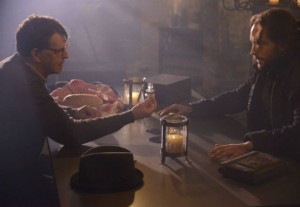 It’s not clear whether other people abhor Henry Parrish. John Noble expertly plays a man who has voluntarily withdrawn from society, burdened by his inexplicable ability. I wonder whether we’ll learn if Parrish’s value at the time of death has made him, too, a man reviled the rest of the time—a scapegoat, one might say (see Leviticus 16.21-22).
It’s not clear whether other people abhor Henry Parrish. John Noble expertly plays a man who has voluntarily withdrawn from society, burdened by his inexplicable ability. I wonder whether we’ll learn if Parrish’s value at the time of death has made him, too, a man reviled the rest of the time—a scapegoat, one might say (see Leviticus 16.21-22).
I initially thought the idea of a Sin Eater was about as far away from Christian theology as one can get. Certainly, Christians don’t believe sins can be mystically transferred from one person to another, through gastrointestinal or other means. But then I realized we aren’t strangers to the idea of one who willingly bears others’ infirmities and carries their diseases, who is wounded for their transgressions and crushed for their iniquities, “from whom others hide their faces” (see Isaiah 53.3-5).
Is Jesus the ultimate Sin Eater? In some sense, he’s the exact opposite. He’s not the eater, but the eaten. “Those who eat my flesh and drink my blood have eternal life,” he promises, “and I will raise them up on the last day” (John 6.54). Some Christians take his words literally; others, symbolically or spiritually; still others strive simply to trust those words’ truth without figuring out their “how.” No less an intellectual than John Calvin declared, regarding Christ’s real presence in the Lord’s Supper, “I will not be ashamed to confess that it is too high a mystery either for my mind to comprehend or my words to express… I rather feel than understand it” (Institutes, IV.17.32). Whatever Jesus meant, he meant that we feed on him in order to be “severed from the Horseman” of Death.
And yet… The idea of the Sin Eater made me think of one of my favorite visions of the future God has in store for the world. The prophet Isaiah foresees the day when God will host a bountiful banquet “for all peoples,” a feast “of rich food filled with marrow, of well-aged wines strained clear” (no counting calories in the age to come). But the main dish on this miraculous menu, is not served by God to us, but eaten by God for us: “he will swallow up death forever” (Isaiah 25.8).
Maybe the notion of the Sin Eater is a glimmer of the truth that sin, death, and evil are not destined to consume us, but to be themselves consumed, completely “swallowed up in victory” (1 Cor. 15.54).
Scripture quotations are from the New Revised Standard Version.

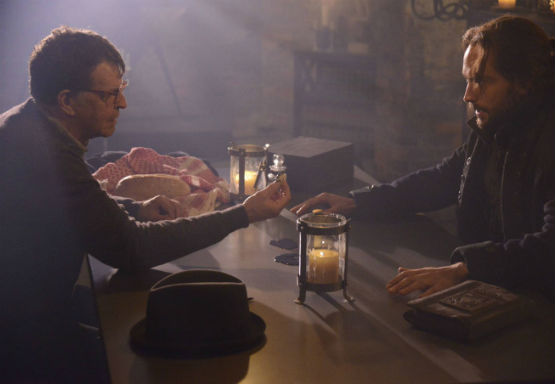
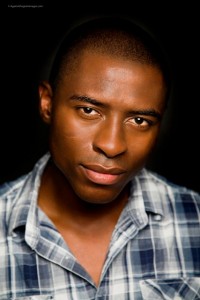
Thank you for linking to my post, Mike! 🙂
I’m so pleasantly surprised with Sleepy Hollow. I wasn’t sure it was going to take off, but I’m really enjoying it. They take a lot of liberties (the biggest I think was making the Horsemen something evil when in the Bible they come from God), but it’s a fictional show and what they’re doing works. I’m kind of glad they aren’t sticking to the books on this one. Much more freedom to stir things up and make them interesting if you aren’t trying to be historically, religiously, or mythologically accurate.
But I completely agree, Abbie and Ichabod are the heart of the show. Not sure how I feel about their relationship turning romantic though, and that’s the rumour I’ve heard flying around!
My pleasure to provide the link, Wendy! I hope SFC readers will check out Seeker of Truth – you do great work over there!
Yeah, something I wanted to get into but didn’t have time or space to do so (this week!) was the problematic nature of “averting the Apocalypse.” On the one hand, ok, saving humanity generally a good thing in genre fiction; on the other hand, Abbie said in episode 5 that she “gets [she is] supposed to be a player in the Big Guy’s endgame.” The best I can figure is that maybe these Horsemen are jumping the gun, but I hope there will be some clarification regarding God’s will in this whole thing as the series goes on. I don’t know, though, it being prime-time TV and all!
I haven’t heard rumors of Abbie and Ichabod’s friendship turning into romance, and it seems Ichabod is still too attached to his wife (rightly so) to pursue a romance with Abbie. If circumstances were to change regarding Ichabod and Katrina, I wouldn’t be opposed to it; but it’s rare to see a strong platonic male-female friendship on TV or in film anymore. We’ll see!
“Now, however, Sleepy Hollow seems reluctant to let Ichabod wrestle with genuine guilt over a genuine failing.”
Yep, I’m getting that sense too. I know you heard me complain about it in my review of an earlier episode (perhaps it was the Sandman episode). For some reason it didn’t bother me as much in this episode (by that I guess I mean I wasn’t as passionate about it?), but that rush to absolve him….We watched Abbie deal with her sin/mistake for far longer. It wasn’t just the fact that she made a choice that created a rift with her sister for years, but we met her when this was still happening. With Ichabod, we meet him in the flashback right when he starts having a change of heart. As a matter of fact, based on his first scene with Katrina, he was already shaky about his position with the redcoats. To go along with that, we meet Ichabod right when this whole Witness thing comes into his life, so we still have no idea who he lived/how he was before he was told he was a Witness (again, unlike Abbie).
This is why his scene with Bernard’s ghost was ridiculous. We had no indication that this murder stayed with Ichabod all these years until literally this episode. We didn’t see him living with it, grappling with it. It had no effect on his personality or his demeanor, or how he interacted with people (unlike in Abbie’s case), yet we’re told that Bernard’s death was a mark on his soul or whatever he said. We were told and not shown.
“Magic Negro” stories apparently focus on a black character, but actually marginalize them. Bernard has been the victim of both slavery and imperialism—but we are told, in effect, it’s all good, because Ichabod Crane—our good white man who was an abolitionist and fellowshipped with Mohawks—needed Bernard in order to “find [his] way to [his] true home.”
Yep, it’s true. It’s this case where the character of color is written to be absolutely fine with their suffering or think it’s worth it or understand it, not because of anything it gets them (because it usually gets them nothing because they’re not the focus of the story, just a tool of it), but because of what it gets the White character(s) in question, male or female. And that’s what Bernard’s entire conversation with Ichabod was about, both before he got shot and when his ghost came back.
“As a matter of fact, based on his first scene with Katrina, he was already shaky about his position with the redcoats.” — Yes, I had not thought about that! Very true.
My sense today from online reaction (I don’t check any until I’ve written my reactions) is that most people liked this one better than I did, but I appreciated your more critical take on it. This show has a good thing going with these characters, but if they’re just gonna make Ichabod Mr. Righteous all the time, that’s going to get really boring, really fast.
Thanks as ever for the comment!
God will eat death … My mind is blown.
Do you watch SPN (Supernatural) too? Because that show addresses Christian Canon but is wonky and all over the place.
I have never seen “Supernatural,” but I know its fans are very passionate about it. I do want to see their episode from Halloween week, because I understand it involved “The Wizard of Oz,” and Oz is one of my other fannish interests! Thanks for the comment!